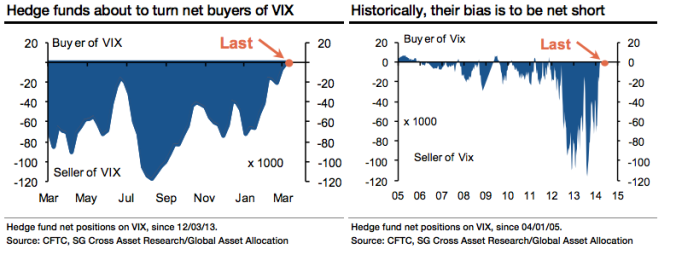 High-Frequency Trading: Rapid Efficiency vs. Technological Calamity
High-Frequency Trading: Rapid Efficiency vs. Technological Calamity
“The Federal Bureau of Investigation has openly solicited traders and stock-exchange workers to blow the whistle on possible front-running and manipulation via high-speed computers.” They are asking people to step forward and explain high-frequency trading, thanks “in part by the complexity of proving any misconduct.” Meanwhile, Virtu Financial, a high-frequency trading company, has decided to delay its IPO for a couple weeks thanks to the current “Flash Boys” environment. Also, Barrons thinks that the market is totally rigged since someone bought put options on Nasdaq shares after they saw a promo for the 60 minutes special on how the Nasdaq is rigged. This is interesting though: “The options trading, and stock price action, suggests Nasdaq’s stock and options are now viewed by investors as the way to trade the HFT investigations.” Meanwhile, Cliff Asness of AQR Capital offers a pretty thorough argument in support of high-frequency trading (alt): “we devote a lot of effort to understanding our trading costs, and our opinion, derived through quantitative and qualitative analysis, is that on the whole high-frequency traders have lowered costs.” That being said, “the biggest concern we have with modern markets is their complexity and the associated operational risks. The market structure that enables the HFTs and provides us with their benefits may also be one that risks technological calamity.” Finally, here’s the CNBC showdown between the Flash Boys.
Chinese Investment: Slowdown Remedy vs. Illusion
“China acted for the first time this year to steady its stumbling economy by cutting taxes for small firms on Wednesday and announcing plans to speed up the construction of railway lines…Increased construction of railway lines will foster investment, the biggest driver of China’s economy…the railway investment will be partly financed by bank loans…Railway projects in China gained infamy in recent years for their rife corruption and heavy debt load.” Meanwhile, Martin Wolf argues that “China will not have a financial meltdown. But the end of its credit addiction will result in lower growth, properly measured.” Furthermore, “Credit cannot grow faster than GDP forever, even in China. The question is not whether it will stop, but how — and when. The longer this goes on, the greater the risk of a nasty surprise down the road. Furthermore, some part of the recent growth has almost certainly been an illusion: investment that does not generate much of a return is in part waste, rather than valuable output — however beneficial its immediate impact on demand may seem to be.” Meanwhile, “investors withdrew a net $42 million from ETFs focused on Chinese equities and bonds since the MSCI Emerging Markets Index began rallying on March 20…That’s the only outflow from the ETFs for the so-called BRIC countries or biggest developing markets as funds investing in Brazil, India and Russia attracted a combined $422 million.”
Hedge Funds Buy Volatility, Mom And Pop Aren’t All That Into Stocks
Is the period of low volatility coming to an end? Hedge funds seem to think so: “Hedgies are generally net short the VIX” since “it costs money to be long and it pays to be short unless the index rises” which it only does very sporadically. Yet the hedgies are close to becoming net buyers, which may indicate there is expectation for volatility in the short-term. Meanwhile, stock market sentiment today feels more like irrational non-exuberance.
Gross: Pressure Rises On Gross As Investors Pull $3.1 Billion From Pimco’s Flagship Fund
“Investors pulled another $3.1 billion from Pimco’s flagship fund in March, the 11th straight month of outflows from the world’s largest bond fund, and its performance on the month lagged 95 percent of its peers due to a spate of wrong calls by long-time manager Bill Gross…In all, investors have pulled $52.1 billion out of the fund since last May, according to Morningstar data. The latest outflows from the fund reduced the portfolio’s assets to $232 billion.”
USA: Private Job Growth Accelerates In March
Global: Equities For The Long Run? Or Property? Or Neither?
Here’s some great graphs showing the performance of GDP vs. Property vs. Equities in Japan, Germany, the US and the UK. But beware: “none of these data series has been adjusted for inflation…dividends and income from property are excluded from equity and property performance.”